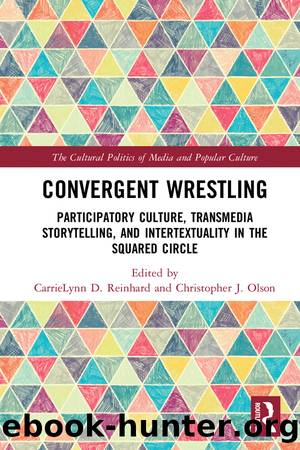Convergent Wrestling by CarrieLynn D. Reinhard Christopher J. Olson

Author:CarrieLynn D. Reinhard, Christopher J. Olson [CarrieLynn D. Reinhard, Christopher J. Olson]
Language: eng
Format: epub
ISBN: 9780367660673
Barnesnoble:
Publisher: Taylor & Francis
Published: 2020-09-30T00:00:00+00:00
Professional wrestling referees like Wuertz often have neutral positions in the main conflict of the event. As referees, they generally have no predetermination of good or evil, as do the wrestlers in the nonverbally narrated stories. Yet, they do more than just fit into the story; referees help to re-create the story while simultaneously acting as a player in it because they occupy the dual roles of director and actor.
Changes in professional wrestling and referees
Many believe that Roman audiences were the original referees by a show of thumbs, up or down, but this is a common misconception, since âthumbs downâ meant to throw the swords down to save the gladiator (Knight, 2016). Today, many common misconceptions exist within the professional wrestling stadium, known to fans as the squared circle. Audiences may think they have the power of decision and may want to re-create the story in the ring; however, they are merely spectators of the dayâs events. Nevertheless, the idea that the audience does not dictate what happens in the ring is a controversial one.
Scott Beekman (2006) offers a generous history of professional wrestling, beginning with the sportâs origins and ending with Vince McMahon. In Ringside, Beekman states that wrestling is one of the two oldest sports (running is the other) and that âaccounts of grappling are found in almost all ancient civilizations around the globeâ (p. 2). Histories of professional wrestling are plentiful and generally began with what seemed to be a sport. According to United World Wrestling (2018), referees worked for wrestling matches going back to the Sumerians and Ancient Egypt, suggesting the importance of rules and codes of conduct, overseen by a referee, even before Greco-Roman wrestling emerged. While refereeing may have been important to such competitive wrestling, less is known about its importance to the history of professional wrestling.
In the early 1900s, professional wrestling transformed from sports competition to orchestrated entertainment. This transformation gave rise to the fakery claims that have framed this form of entertainment (Maguire, 2005). Audiences must suspend their disbelief to buy into the idea that professional wrestling is real, and many who fail to understand what a performance is or means will claim that it is fake. The idea of fakery still shadows professional wrestling in some respects, though, as Heather Levi (2008) points out in her analysis of lucha libre, Mexican wrestlers deny fakery charges, claiming their style of wrestling derives from the circus and sports.
Sometime after WWI, wrestling promoters took control of the events, and the balance of power shifted from individual athletes to the wrestling business. The promoters recognized that predetermined finishes kept fans interested in their product and left wrestlers at their mercy (Beekman, 2006). In the 1980s, McMahon âredefined wrestling as âsports entertainmentâââ (p. x), allowing him to sell professional wrestling as entertainment on cable television and pay-per-view events. The predetermined match made the refereeâs position even more important as they were now, more than ever, called upon to uphold the plans of the event.
The WWEâs (2012)
Download
This site does not store any files on its server. We only index and link to content provided by other sites. Please contact the content providers to delete copyright contents if any and email us, we'll remove relevant links or contents immediately.
Shoe Dog by Phil Knight(5257)
The Rules Do Not Apply by Ariel Levy(4957)
Walking by Henry David Thoreau(3952)
How to Read Water: Clues and Patterns from Puddles to the Sea (Natural Navigation) by Tristan Gooley(3460)
Running Barefoot by Amy Harmon(3445)
I'll Give You the Sun by Jandy Nelson(3428)
Crazy Is My Superpower by A.J. Mendez Brooks(3398)
How to Read Nature by Tristan Gooley(3333)
How Music Works by David Byrne(3259)
The Boy, the Mole, the Fox and the Horse by Charlie Mackesy(3110)
The Fight by Norman Mailer(2927)
Seducing Cinderella by Gina L. Maxwell(2640)
Cuba by Lonely Planet(2629)
Accepted by Pat Patterson(2364)
Going Long by Editors of Runner's World(2356)
The Unfettered Mind: Writings from a Zen Master to a Master Swordsman by Takuan Soho(2304)
Backpacker the Complete Guide to Backpacking by Backpacker Magazine(2240)
The Happy Runner by David Roche(2233)
Trail Magic by Trevelyan Quest Edwards & Hazel Edwards(2177)
